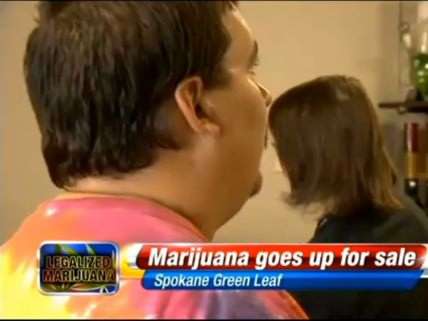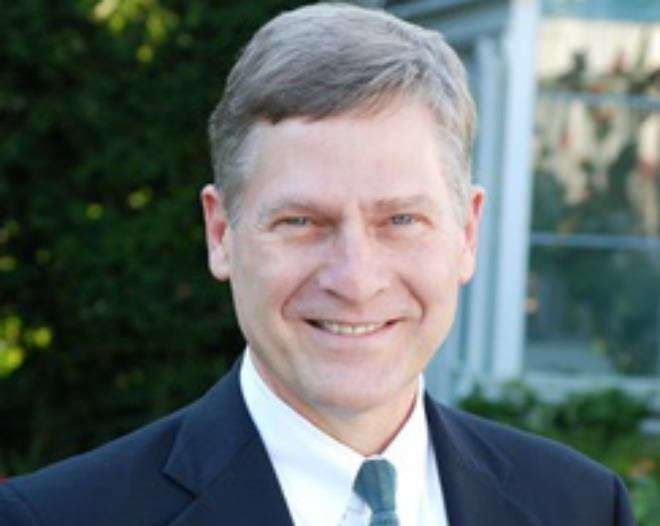Does Marijuana Legalization Make Pot Smokers Employable?

Last week, when legal recreational sales of marijuana began in Washington, Mike Boyer, a 30-year-old security guard, was Spokane's first buyer, having camped out for 19 hours at Green Leaf, a local dispensary. Boyer was featured in TV reports, saying things like, "We don't line up for Black Friday; we line up for Green Tuesday." Those 15 minutes of fame cost him his job.
But not for long. Last Thursday his employer, TrueBlue, said the whole thing had been a misunderstanding. Boyer's boss, after seeing him buy pot on TV, ordered him to take a drug test, which he failed. "We were not aware that he had taken the day off," a company spokeswoman told NBC News. "He was scheduled to work, we saw him on TV that he was under the influence, and that caused us to start a process of screening. When we realized that he was not on assignment, we reinstated him….Pot is legal, and we know that."
In other words, as long as he's not impaired on the job, why should we care what he does on his own time? That's a pretty sensible attitude. It's the policy that almost every employer adopts with regard to alcohol. So why not pot?
I considered that question in a Reason feature story back in 2002. By that point it had become very common for private employers to demand urine from prospective employees, ostensibly with the goal of maintaining a "drug-free workplace." These tests overwhelmingly catch cannabis consumers, since marijuana is by far the most popular illegal drug and the one with the longest detection window. The tests do not measure impairment, since marijuana metabolites linger long after the drug's effects have worn off—from days to weeks afterward, depending on the frequency of cannabis consumption. Talking to employers who test applicants, I found that they were not concerned about impairment so much as screening out the sort of people who fail pre-employment drug tests.
A positive urinalysis "proves someone has engaged in illegal behavior," Michael Walsh, a leading drug testing consultant, told me. "All companies have rules, and this is a way of screening out people who are not going to play by the rules." He conceded that "you are going to rule out some people who would have made really good employees, and you are going to let in some people who make lousy employees." Still, he said, "in a broad way, it's a fairly decent screening device," especially since applicants generally know about the tests far enough in advance that they can pass by abstaining for a while. "The reality is that a pre-employment drug test is an intelligence test," Walsh said. The people who test positive are "either addicted to drugs, and can't stay away for two or three days, or just plain stupid….Employers don't want either of those." Alternatively, employers may view applicants who fail a drug screen as reckless or lazy.
But that sort of reasoning makes sense only in a world where cannabis consumers are lawbreakers whom employers seek to identify with easily evaded methods, such that those who are caught can be presumed to be lacking in foresight or self-control. Another reason pot prohibition is crucial in understanding the prevalence of drug testing, I argued, is that the government has conscripted and enlisted employers to enforce the drug laws, just as it has compelled them to enforce the immigration laws:
Federal policies requiring or encouraging drug testing by private employers include transportation regulations, conditions attached to government contracts, and propaganda aimed at convincing companies that good corporate citizens need to take an interest in their workers' urine. From the government's perspective, it does not matter whether this urological fixation is good for a company's bottom line. And given the meagerness of the evidence that drug testing makes economic sense, it probably would be much less popular with employers if it were purely a business practice rather than a weapon of prohibition. If it weren't for the war on drugs, it seems likely that employers would treat marijuana and other currently illegal intoxicants the way they treat alcohol, which they view as a problem only when it interferes with work.
The rehiring of Mike Boyer suggests that prediction may be gradually coming true. I-502, the initiative that legalized marijuana in Washington, leaves businesses free to continue testing applicants and employees for drugs, and many will continue to take advantage of that freedom, whether out of habit or because of issues raised by continued federal prohibition. But it seems reasonable to expect that a growing number of businesses will adopt policies like TrueBlue's.

The public sector may take more time to adjust. On the same day that Boyer became Spokane's first legal buyer of recreational marijuana, Seattle City Attorney Pete Holmes, a leading supporter of legalization, bought two grams at Cannabis City, the first state-licensed pot shop to open in Seattle. A few days later, Holmes felt compelled to apologize for violating the city's drug-free workplace policy by returning to his office after his visit to Cannabis City and leaving his purchase there until the end of the work day.
Holmes did not open the sealed package of marijuana, let alone smoke it. But the city's policy bars "the unlawful…possession or use of a controlled substance," a category that includes marijuana. The rules do not mention mere possession (as opposed to consumption) of alcohol, so presumably it would be OK for Holmes to buy a bottle of wine on his lunch break and stash it at his office until he went home.
Furthermore, the city does not test job applicants for alcohol. Even if it did, such tests would identify only people who had recently consumed alcohol, as opposed to drinkers in general. But the city does test applicants in certain "safety-sensitive" categories (such as firefighters, police officers, and bus drivers) for illegal drugs, which in practice mostly means marijuana. The upshot is that Seattle is fine with hiring drinkers for those positions but refuses to hire pot smokers, even if they are never impaired on the job. That distinction, which never made much sense, is even harder to justify now that possession and consumption of marijuana are no longer crimes under state law.
[This post originally appeared at Forbes.]


Show Comments (20)